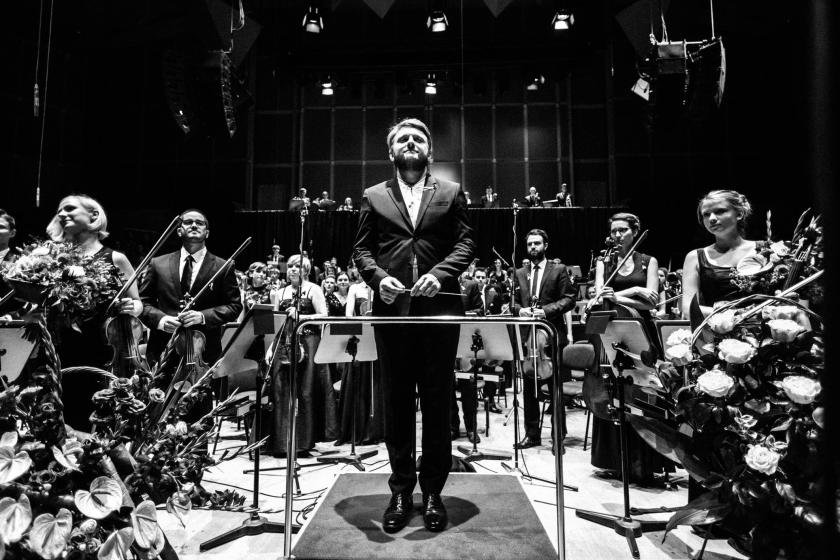It is easy to be blinded by the sensational history of Shostakovich’s Seventh Symphony, the “Leningrad”. We cannot forget the famous performance by a starving makeshift orchestra in August 1942, at the height of the siege of Leningrad, or the dramatic way in which the Soviet authorities spirited the microfilmed score out of Russia to America via Tehran. Inscribed by the composer “To the City of Leningrad”, the symphony has been laden since birth with political meaning, much of it contradictory. Does the notorious, all-consuming march in the first movement represent the advance of the German army, or Stalin’s obliteration of Russian society? The composer was artfully vague in his replies.
With the current political unrest and military instability on the Russian-Ukrainian frontier, one might expect that a performance of the 'Leningrad' by an Eastern European youth orchestra under the baton of the Ukrainian conductor Kirill Karabits would uncover contemporary resonances of its own, but this was an interpretation in which the music, first and last, spoke for itself, quietly, beautifully, and triumphantly. The I, CULTURE Orchestra, or ICO, was founded in Warsaw in 2011 and draws its players from Poland and the Eastern Partnership states: Armenia, Azerbaijan, Belarus, Georgia, Moldova, and Ukraine. For such a young band, with such young players, the sound is remarkably broad and unified, one or two cloudy brass entries the only discernible difference between this and more established ensembles.
 By any standards it is a huge orchestra, with a high proportion of female players, and the sheer volume of sound in this most noisy of symphonies was enough to impress the most cynical listener. From the first tentative rat-a-tat on the side drum, the Allegretto march grew steadily, inexorably, in power. But for those who seek evil in the unstoppable progress of this trite little tune (above, anti-aircraft machinery during the siege of Leningrad), there was none. With undemonstrative authority, Karabits allowed the music to unfold. The lower strings, whose role can be to rasp and unsettle, added depth and richness to the cacophony. The brass were not strident and militaristic but warm and biscuity.
By any standards it is a huge orchestra, with a high proportion of female players, and the sheer volume of sound in this most noisy of symphonies was enough to impress the most cynical listener. From the first tentative rat-a-tat on the side drum, the Allegretto march grew steadily, inexorably, in power. But for those who seek evil in the unstoppable progress of this trite little tune (above, anti-aircraft machinery during the siege of Leningrad), there was none. With undemonstrative authority, Karabits allowed the music to unfold. The lower strings, whose role can be to rasp and unsettle, added depth and richness to the cacophony. The brass were not strident and militaristic but warm and biscuity.
Much of the apparent naivety of the first movement’s themes is continued in the second, here performed with sweet innocence and charm that few performances achieve, or even attempt. The third movement, largely static, left space for contemplation, with a particularly lovely sound in a cantabile section for the large viola section.
As the symphony blazed its way to the affirmation of its conclusion it felt that a work so often marginalised by critics for its lack of emotional depth was here being celebrated for the simplicity and power of its music alone. It seemed inevitable that as the thud of the great bass drum marked the end, so the near-capacity audience should erupt with the most enthusiastic applause that I have yet heard this Edinburgh Festival, with each section of the orchestra as they were brought to their feet receiving ever louder accolades, particularly the young man on the side drum and the athletic young woman next to him on the timpani.
It would be easy to forget, in the wake of such a performance, the work that preceded it: the Sinfonia elegiaca by Andrzej Panufnik, who died in 1991. This too is a work that concerns itself with war, reflecting the composer’s bleak view that the sacrifice of war has done nothing to bring peace to the world. Spanning just 20 minutes in three linked movements, this is a simple and expressive work whose slow outer movements have something of an English flavour, with expansive but slightly bland harmonies, while the motoric central section speaks of the inhumanity of war with a rather polite vehemence. Any slight uncertainty that the players may have felt in interpreting this enigmatic piece was soon dispelled after the interval.













Add comment